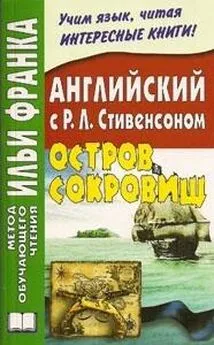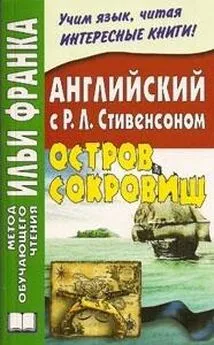Илья Франк - Английский язык с Р.Л. Стивенсоном. Остров сокровищ
- Название:Английский язык с Р.Л. Стивенсоном. Остров сокровищ
- Автор:
- Жанр:
- Издательство:неизвестно
- Год:неизвестен
- ISBN:нет данных
- Рейтинг:
- Избранное:Добавить в избранное
-
Отзывы:
-
Ваша оценка:
Илья Франк - Английский язык с Р.Л. Стивенсоном. Остров сокровищ краткое содержание
Английский язык с Р.Л. Стивенсоном. Остров сокровищ - читать онлайн бесплатно ознакомительный отрывок
Интервал:
Закладка:
сворой» ).
Мультиязыковой проект Ильи Франка www.franklang.ru
379
2. They paused, as if taken aback (они остановились, словно ошеломленные = в
замешательстве; aback — назад; задом; сзади; taken aback — ошеломленный,
захваченный врасплох ); and before they recovered (и, прежде чем они
опомнились), not only the squire and I, but Hunter and Joyce from the block
house, had time to fire (не только сквайр и я, но и Хантер и Джойс из сруба
успели: «имели время» выстрелить). The four shots came in rather a scattering
volley (четыре выстрела прозвучали в довольно рассеянном залпе =
нестройно); but they did the business (но они сделали свое дело): one of the
enemy actually fell (один из врагов упал; actually — на самом деле, теперь ),
and the rest, without hesitation, turned and plunged into the trees (а остальные,
без колебаний, развернулись и бросились в деревья = скрылись за
деревьями).
3. After reloading, we walked down the outside of the palisade to see the fallen
enemy (после перезарядки /ружей/ мы вышли за частокол посмотреть на
упавшего врага). He was stone dead — shot through the heart (он был
совершенно мертв — застрелен в сердце; stone — камень; каменный; полный,
абсолютный, безусловный, совершенный ).
enclosure [In`klquZq] volley [`vOlI] hesitation [hqzI`teISn] plunged [plAnGd]
palisade [pxlI`seId]
1. Forty paces farther we came to the edge of the wood and saw the stockade
in front of us. We struck the enclosure about the middle of the south side, and,
almost at the same time, seven mutineers — Job Anderson, the boatswain, at
their head — appeared in full cry at the south-western corner.
Мультиязыковой проект Ильи Франка www.franklang.ru
380
2. They paused, as if taken aback; and before they recovered, not only the
squire and I, but Hunter and Joyce from the block house, had time to fire.
The four shots came in rather a scattering volley; but they did the business:
one of the enemy actually fell, and the rest, without hesitation, turned and
plunged into the trees.
3. After reloading, we walked down the outside of the palisade to see the fallen
enemy. He was stone dead — shot through the heart.
1. We began to rejoice over our good success (мы начали радоваться нашему
успеху), when just at that moment a pistol cracked in the bush (когда прямо в тот
же миг в кустах щелкнул пистолет), a ball whistled close past my ear (пуля
просвистела рядом с моим ухом), and poor Tom Redruth stumbled and fell his
length on the ground (и бедный Том Редрут пошатнулся и упал во весь свой
рост на землю; to stumble — споткнуться, оступиться ). Both the squire and I
returned the shot (оба я и сквайр = мы со сквайром ответили на выстрел =
выстрелили в ответ в кусты); but as we had nothing to aim at (но так как нам не
во что было целиться), it is probable we only wasted powder (возможно, мы
только зря истратили порох). Then we reloaded, and turned our attention to poor
Tom (затем мы перезарядили /ружья/ и обратили внимание на бедного Тома).
2. The captain and Gray were already examining him (капитан и Грей уже
осматривали его); and I saw with half an eye that all was over (а я увидел
половиной глаза = только взглянул на него /и понял/, что все кончено).
3. I believe the readiness of our return volley had scattered the mutineers once
more (полагаю, что быстрота нашего ответного залпа вновь рассеяла
мятежников; readiness — готовность, охота, живость ), for we were suffered
without further molestation (так как мы без дальнейших нападений; to suffer —
страдать, терпеть, выносить; molestation — приставание; нападение; to
Мультиязыковой проект Ильи Франка www.franklang.ru
381
molest — приставать; досаждать ) to get the poor old gamekeeper hoisted over
the stockade (/смогли/ перетащить бедного старого егеря через частокол; to
hoist — поднимать ), and carried, groaning and bleeding, into the log-house (и
внесли /его/, стонущего и истекающего кровью, в сруб).
rejoice [rI`GOIs] readiness [`redInIs] suffered [`sAfqd] molestation
[mOle`steISn] molest [mq`lest]
1. We began to rejoice over our good success, when just at that moment a
pistol cracked in the bush, a ball whistled close past my ear, and poor Tom
Redruth stumbled and fell his length on the ground. Both the squire and I
returned the shot; but as we had nothing to aim at, it is probable we only
wasted powder. Then we reloaded, and turned our attention to poor Tom.
2. The captain and Gray were already examining him; and I saw with half an
eye that all was over.
3. I believe the readiness of our return volley had scattered the mutineers once
more, for we were suffered without further molestation to get the poor old
gamekeeper hoisted over the stockade, and carried, groaning and bleeding,
into the log-house.
1. Poor old fellow, he had not uttered one word of surprise (бедный старый
товарищ, он не произнес ни слова удивления), complaint, fear, or even
acquiescence (недовольства, страха, ни даже согласия = не ворчал;
acquiescence — уступка, согласие ), from the very beginning of our troubles till
now (с самого начала наших неприятностей до теперешнего /дня/), when we
Мультиязыковой проект Ильи Франка www.franklang.ru
382
had laid him down in the log-house to die (когда мы уложили его в срубе
умирать). He had lain like a Trojan behind his mattress in the gallery (он лежал
/геройски/, словно троянец, за матрацем в проходе /на корабле/; to lie —
лежать, располагаться ); he had followed every order silently, doggedly, and
well (он выполнял любое приказание молчаливо, упорно и хорошо); he was
the oldest of our party by a score of years (он был самым старшим в нашей
команде = был старше всех лет на двадцать; score — зарубка; счет; два
десятка ); and now, sullen, old, serviceable servant, it was he that was to die (и
теперь этот угрюмый старый верный слуга должен был умереть; serviceable
— полезный, прочный; услужливый ).
2. The squire dropped down beside him on his knees and kissed his hand, crying
like a child (сквайр упал возле него на колени и поцеловал его руку, плача,
словно ребенок).
3. 'Be I going, doctor (я умираю, доктор)?' he asked.
4. 'Tom, my man (Том, мой друг),' said I, 'you're going home (ты уходишь на
покой; to go home — идти домой, умереть, отправиться к праотцам ).'
сomplaint [kqm`pleInt] acquiescence [xkwI`esns] sullen [`sAlqn] knee [nJ]
1. Poor old fellow, he had not uttered one word of surprise, complaint, fear, or
even acquiescence, from the very beginning of our troubles till now, when we
had laid him down in the log-house to die. He had lain like a Trojan behind
his mattress in the gallery; he had followed every order silently, doggedly, and
well; he was the oldest of our party by a score of years; and now, sullen, old,
serviceable servant, it was he that was to die.
Мультиязыковой проект Ильи Франка www.franklang.ru
383
2. The squire dropped down beside him on his knees and kissed his hand,
crying like a child.
3. 'Be I going, doctor?' he asked.
4. 'Tom, my man,' said I, 'you're going home.'
1. 'I wish I had had a lick at them with the gun first (я желал бы = жаль, что я не
послал им пулю раньше /перед смертью/; lick — облизывание; сильный удар ),'
he replied (он ответил).
2. 'Tom,' said the squire, 'say you forgive me, won't you (скажи, ты прощаешь
меня, да)?'
3. 'Would that be respectful like, from me to you, squire (почтительно ли это, мне
/не прощать/ вас, сквайр)?' was the answer (был ответ). 'Howsoever, so be it,
amen (как бы то ни было, да будет так /как вы хотите/, аминь)!'
4. After a little while of silence (через некоторое время после молчания), he said
he thought somebody might read a prayer (он сказал, чтобы кто-нибудь прочел:
«мог бы прочесть» молитву). 'It's the custom, sir (таков обычай, сэр),' he added
apologetically (добавил он, /словно/ извиняясь). And not long after, without
another word, he passed away (и немного спустя, не говоря ни слова, он
скончался).
howsoever [hausqu`evq] amen [R`men] prayer [preq] apologetically
[qpOlq`GetIklI]
1. 'I wish I had had a lick at them with the gun first,' he replied.
Читать дальшеИнтервал:
Закладка:


